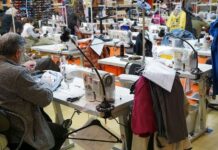A recent report from the Swedish NGO Swedwatch has unveiled troubling connections between public funding for hospital textiles and labor rights abuses within Pakistan’s textile industry. The findings highlight significant shortcomings in the EU’s public procurement regulations and call on the European Commission to establish binding due diligence standards to ensure that public spending does not contribute to human rights violations.
Pakistan serves as a vital supplier of hospital linens and textiles for the European market, notably for the Swedish healthcare sector. However, Swedwatch’s latest report, titled Public Money, Private Harm, draws on interviews with 89 workers across nine factories in Faisalabad and Karachi, revealing that EU nations, including Sweden, continue to rely on suppliers with a history of labor rights abuses.
The report is based on field research carried out in collaboration with the Pakistani NGO AwazCDS-Pakistan.
Workers Facing Widespread Exploitation
The conditions reported by workers in these factories are alarming. Many are paid below the official minimum wage, which itself is less than half of what is considered a living wage. Most workers lack formal contracts and do not receive adequate social protection in the event of illness or injury. They also face long working hours, unsafe working conditions, and reports of union suppression, along with discrimination and harassment, particularly against women.
Zia ur Rehman, Founder and Chief Executive of AwazCDS-Pakistan, expressed grave concerns about the high levels of exploitation within supply chains, particularly in textile manufacturing. “The enforcement of local labor laws is severely lacking due to a governance and legitimacy crisis in the country,” he stated, emphasizing the urgent need for transparent legal practices in supplier contracts, targeted awareness initiatives, and effective enforcement mechanisms to uphold human rights standards.
Links to Swedish Hospitals
The factories under scrutiny produce goods for European suppliers, including those contracted by Swedish Regions for hospital and healthcare textiles. Despite commendable efforts by these Regions to integrate sustainability codes of conduct and contract stipulations, the report reveals that without enforceable sustainability requirements at the EU level, procurement practices fail to effectively prevent or address labor rights abuses.
Sofia Käll, Programme Officer at Swedwatch and lead researcher of the report, remarked, “Flaws in the EU’s public procurement directive allow taxpayer funds to inadvertently support a system that perpetuates exploitation, undermining human rights and fair competition. Public procurement should be a force for good, not a facilitator of abuse.”
The Need for Stronger Regulations
The EU’s Public Procurement Directive, adopted in 2014, governs public procurement across member states. Although the directive allows for the inclusion of social and environmental criteria, its implementation remains voluntary and is marked by weak enforcement. Consequently, companies associated with labor rights abuses can still secure public contracts, often winning bids with lower prices over more responsible suppliers.
“This complicity in exploitative working conditions makes the European public sector part of the problem,” Käll asserted.
While textiles from Pakistan represent a small fraction of the EU’s annual public procurement expenditure of €2 trillion, similar risks of labor rights violations are present in various sectors, including electronics, agriculture, and construction.
“The experiences shared by workers in Karachi and Faisalabad are merely the tip of the iceberg regarding exploitation across global supply chains tied to European procurement. However, this also presents an opportunity for change. When procurement is designed responsibly, it can significantly enhance conditions for millions of workers across different industries,” Käll added.
Recommendations for a Better Future
Swedwatch’s findings raise pivotal questions regarding the EU’s public procurement laws. With the European Commission currently reevaluating the Public Procurement Directive, this is a critical moment for reform.
To foster robust mechanisms for addressing harm within global supply chains, EU policymakers should introduce mandatory human rights due diligence requirements into procurement law. These processes should align with internationally recognized standards, including meaningful engagement with workers to avoid superficial compliance.
Additionally, EU member states and their procurement officers need adequate support and resources to enforce sustainability requirements effectively. A well-equipped procurement workforce could lead to more socially responsible outcomes and enhance public trust.
Background on the Research
Swedwatch’s report is based on qualitative research conducted in two phases in Pakistan—initially in Faisalabad from January to July 2023, followed by an expanded study in Faisalabad and Karachi in November 2024. Collaborating with AwazCDS-Pakistan, the research involved 12 in-depth interviews with factory workers and eight focus group discussions with 89 participants, maintaining a balanced gender representation.
Public procurement in the EU accounts for roughly 15% of GDP—around €2 trillion annually—granting public authorities substantial influence over environmental sustainability and human rights in global supply chains. By incorporating social and environmental criteria into procurement policies, authorities can promote responsible business practices, particularly in high-risk industries such as textiles.
Swedwatch is an independent, non-profit research organization with over a decade of experience investigating public procurement’s role in addressing human rights and environmental challenges. Since 2025, it has been a member of the European Commission’s Stakeholder Expert Group on Public Procurement.
Fact Box
The textile industry is Pakistan’s largest manufacturing sector, comprising approximately 60% of the nation’s total exports in 2021. While centralized data on healthcare textiles procured by Swedish Regions is currently unavailable, a mapping exercise conducted by the Regions’ sustainable public procurement network indicates that between 30% and 50% of production for certain suppliers occurs in Pakistan. Several EU-based companies supplying healthcare textiles to Sweden’s public sector have confirmed that Pakistan is a key production hub in their supply chains.

































